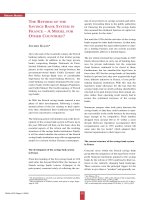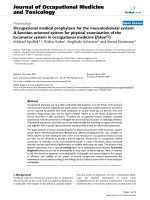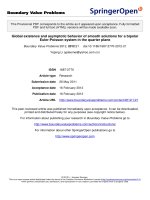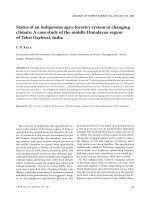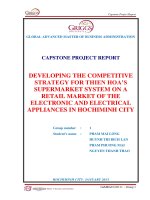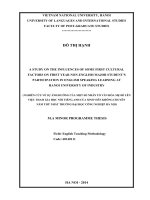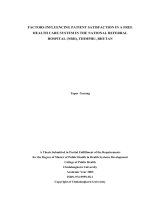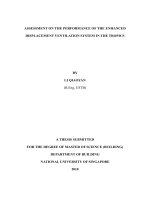The Influences of Budgetary System in a Selection of Large Chinese companies in the Industry of Electronic Household Appliances
Bạn đang xem bản rút gọn của tài liệu. Xem và tải ngay bản đầy đủ của tài liệu tại đây (6.16 MB, 529 trang )
❉✉r❤❛♠ ❊✲❚❤❡s❡s
❚❤❡ ■♥✢✉❡♥❝❡s ♦❢ ❇✉❞❣❡t❛r② ❙②st❡♠ ✐♥ ❛ ❙❡❧❡❝t✐♦♥ ♦❢
▲❛r❣❡ ❈❤✐♥❡s❡ ❝♦♠♣❛♥✐❡s ✐♥ t❤❡ ■♥❞✉str② ♦❢ ❊❧❡❝tr♦♥✐❝
❍♦✉s❡❤♦❧❞ ❆♣♣❧✐❛♥❝❡s
❋❯✱ ❳■❆❖
❍♦✇ t♦ ❝✐t❡✿
❋❯✱ ❳■❆❖ ✭✷✵✶✷✮ ❚❤❡ ■♥✢✉❡♥❝❡s ♦❢ ❇✉❞❣❡t❛r② ❙②st❡♠ ✐♥ ❛ ❙❡❧❡❝t✐♦♥ ♦❢ ▲❛r❣❡ ❈❤✐♥❡s❡ ❝♦♠♣❛♥✐❡s ✐♥ t❤❡
■♥❞✉str② ♦❢ ❊❧❡❝tr♦♥✐❝ ❍♦✉s❡❤♦❧❞ ❆♣♣❧✐❛♥❝❡s✱ ❉✉r❤❛♠ t❤❡s❡s✱ ❉✉r❤❛♠ ❯♥✐✈❡rs✐t②✳ ❆✈❛✐❧❛❜❧❡ ❛t ❉✉r❤❛♠
❊✲❚❤❡s❡s ❖♥❧✐♥❡✿ ❤tt♣✿✴✴❡t❤❡s❡s✳❞✉r✳❛❝✳✉❦✴✸✻✹✹✴
❯s❡ ♣♦❧✐❝②
❚❤❡ ❢✉❧❧✲t❡①t ♠❛② ❜❡ ✉s❡❞ ❛♥❞✴♦r r❡♣r♦❞✉❝❡❞✱ ❛♥❞ ❣✐✈❡♥ t♦ t❤✐r❞ ♣❛rt✐❡s ✐♥ ❛♥② ❢♦r♠❛t ♦r ♠❡❞✐✉♠✱ ✇✐t❤♦✉t ♣r✐♦r ♣❡r♠✐ss✐♦♥ ♦r
❝❤❛r❣❡✱ ❢♦r ♣❡rs♦♥❛❧ r❡s❡❛r❝❤ ♦r st✉❞②✱ ❡❞✉❝❛t✐♦♥❛❧✱ ♦r ♥♦t✲❢♦r✲♣r♦✜t ♣✉r♣♦s❡s ♣r♦✈✐❞❡❞ t❤❛t✿
•
❛ ❢✉❧❧ ❜✐❜❧✐♦❣r❛♣❤✐❝ r❡❢❡r❡♥❝❡ ✐s ♠❛❞❡ t♦ t❤❡ ♦r✐❣✐♥❛❧ s♦✉r❝❡
•
❛ ❧✐♥❦ ✐s ♠❛❞❡ t♦ t❤❡ ♠❡t❛❞❛t❛ r❡❝♦r❞ ✐♥ ❉✉r❤❛♠ ❊✲❚❤❡s❡s
•
t❤❡ ❢✉❧❧✲t❡①t ✐s ♥♦t ❝❤❛♥❣❡❞ ✐♥ ❛♥② ✇❛②
❚❤❡ ❢✉❧❧✲t❡①t ♠✉st ♥♦t ❜❡ s♦❧❞ ✐♥ ❛♥② ❢♦r♠❛t ♦r ♠❡❞✐✉♠ ✇✐t❤♦✉t t❤❡ ❢♦r♠❛❧ ♣❡r♠✐ss✐♦♥ ♦❢ t❤❡ ❝♦♣②r✐❣❤t ❤♦❧❞❡rs✳
P❧❡❛s❡ ❝♦♥s✉❧t t❤❡ ❢✉❧❧ ❉✉r❤❛♠ ❊✲❚❤❡s❡s ♣♦❧✐❝② ❢♦r ❢✉rt❤❡r ❞❡t❛✐❧s✳
❆❝❛❞❡♠✐❝ ❙✉♣♣♦rt ❖✣❝❡✱ ❉✉r❤❛♠ ❯♥✐✈❡rs✐t②✱ ❯♥✐✈❡rs✐t② ❖✣❝❡✱ ❖❧❞ ❊❧✈❡t✱ ❉✉r❤❛♠ ❉❍✶ ✸❍P
❡✲♠❛✐❧✿ ❡✲t❤❡s❡s✳❛❞♠✐♥❅❞✉r✳❛❝✳✉❦ ❚❡❧✿ ✰✹✹ ✵✶✾✶ ✸✸✹ ✻✶✵✼
❤tt♣✿✴✴❡t❤❡s❡s✳❞✉r✳❛❝✳✉❦
✷
The Influences of Budgetary System in a
Selection of Large Chinese companies in the
Industry of Electronic Household Appliances
Xiao Fu
PhD Study in Durham Business School
Submission in 2012
Supervisors: Professor Rob Dixon
Ms Anne Woodhead
Declaration and Statement of Copyright
The research presented in this thesis is the original work of the author, unless stated otherwise.
The copyright of this thesis rests with the author. No quotation from it should be published
without their prior consent and information derived from it should be acknowledged.
Acknowledgement
I appreciate my family’s selfless emotional and financial support for my PhD study.
I thank Professor Rob Dixon for knowledge about management accounting and doctoral level
research, especially his patience in training me from a blank canvas at the beginning of my
PhD study. I appreciate that Ms Anne Woodhead joined the supervising team. I acknowledge
my examiners Mr Alan Coad and Ms Riham Rizk, for their intellectual input in reading my
thesis and their suggestions, although it is natural that academic opinions may differ. Based
on their major advice, I focused this stage of research of this project on an in-depth
qualitative case study. This produced a constructive outcome. Two main streams of data
findings have been well received during the correction period of time. A paper (cooperated
with Rob and Anne) based on this project’s findings about Institutional Theory Approach in
management accounting (chapter 6) has been accepted by BAA’s (now BAFA’s) annual
conference 2010, after which I was invited to present at the 8th International Management
Control Conference 2010, and I was honoured to be the only participant from mainland China
at this conference which academies from 26 countries or regions attended. My paper based on
this project’s findings about Contingency Theory Approach in management accounting
(chapter 4) was presented at the highest meeting of AAA’s annual conference Denver 2011.
At the final stage of examination on corrections, Professor Mike Humphreys became my new
internal examiner when the original internal examiner was absent. I appreciate his careful
examination and efficient response.
Professor Robert Scapens had generously spent half an hour for me, during BAA’s annual
conference 2005. I appreciate his friendliness as well as Professor Scapens and Doc. Burns’
recommendation of references. These gave me encouragement especially because the
interpretive ontology leads this thesis to its important findings. Doc. Lydia from Durham
University has taught me expertise about NVivo. I thank her for her cross disciplinary help to
this research project. Professor Liza Jack, Professor Mike Tayles, Professor John Collen, and
Dr. Martin Quinn gave advices on this thesis’ findings about Institutional Theory Approach at
BAA 2010 and MCA 2010. Professor D. T. Otley (MCA 2010), Professor Edward Walker,
and Professor Chris Chapman (AAA 2011) gave advices on this thesis’ findings about
Contingency Theory Approach. Professor Olive Emmanuel gave advices on this thesis’ use
of Nvivo to analyse qualitative data at MCA’s Doctoral Colloquium 2010. As learning is an
endless process, I wish to still keep learning from all of these scholars after this stage of study,
and I am looking forward to possible future cooperation. Without permission and strong
support by Mr H from Company A and Mr Ch. from Company B, this research project can
never come into being. I would like to thank them for always being so willing to help. Mr H
especially was like a mentor by allowing me to follow him for months for participant
observation and teaching me his experiences. For confidentiality reasons, I cannot
acknowledge Mr H, Mr Ch., and their colleagues who have helped me for data collection by
their full names, yet the appreciation remains the same.
It is literally impossible to accomplish this project without the genuine supports from certain
supportive staff from other administrative units of Durham University, including Ms
Elizabeth Amies at the Academic Support Office of Durham University, Mr Tim Broadwell
at the Immigration Unit of Durham University, and Ms Brenda Ryder at Ustinov College of
Durham University. Durham Business School has been a supportive community in its own
way. I would like to thank Doc. Peter Hamilton for his conversation about ‘rhetoric’,
Professor Timothy Clark for providing me opportunity of presenting at Northeast students’
workshop, the Dean’s office (especially Ms Emily Aitken and Ms Asheigh), Doctoral office
(especially Ms Anne Bailey, Ms Trisha Taylor, and Ms Frances Paylor), IT office (for
rescuing me so many times), and DBS library (many thanks for Collin and Debbie for
professional advices in academic research and resources searching, and Ercument Aksak for
his help and kindness to me) for their constant support. I appreciate old Frank’s help and
kindness when I was doing evening shift part-time job in DBS library. I am also thankful to
many fellow PhD students, Terak for bringing me articles concerning China back from
conferences, Mohamed and Juliana (especially thanks Juliana for NVivo since we share
similar methodology and software, Mohamed for Institutional Theory and NVivo) for
teaching me presentation skills, Sinan for good advices in my final stage of writing up, and
Diana for sharing last stage PhD experiences before she left.
Wu Liang and Li Ji have provided I.T. help. I thank Dr. Philip Nathan providing English
consultation at Durham University, Dr. Clare Wright in linguistic study, Dr. Yoonjoung Choi
in English literature study, and Andrew Wright in business, Christian Errikson, and Ashley
Ogdon for proof reading. I thank other friends especially France, the Nortons, the Davies, the
Collens, Jacki Thompson-Calvert and Dr. Linda Thompson to have faith in me, during ups
and downs, and whose wisdom supports me during uninvited life dramas of all kinds.
Last but not least, I would like to thank Professor C. W. Nobes, whose knowledgeable and
interesting lectures I attended in Reading University during an MSc program, aroused my
interests in accounting for the first time, and introduced me to this area. He as a role model of
a dedicated academy and an upright gentleman, has always been, and will always be, a
guiding light for me to find the right path in research and have faith in doing the right things,
even in total darkness, loneliness, and pain.
Abstract
Budgetary control has been used and researched for years by both Western academics and
practitioners. In China, it is re-emerging as a tool to implement management control, but
might be used in different ways both in terms of understanding and operation. The research
objective of this thesis is to examine the applicability of Western theories of change in
management accounting in the context of budgeting in Chinese corporations.
Challenges can exist because of the differences between Western assumptions and Chinese
reality. The current thesis focuses on difficulties Chinese companies encounter in practical
and deeper ideological ways: firstly, Western market-based ideology conflicts with an
ideology which has been shaped by central-planning for decades; secondly, difficulties stem
from the different cultural context of China which emphasizes hierarchical politeness, kinship
ties, trust based on personal relationships, collectivism and social harmony, diligence and
individual modesty, and less developed modern legal regulatory systems – these all
contribute to China’s own way of doing things. This thesis also focuses on the transition
process in China. Based on the assumption that budgetary changes do not happen in isolation
from other management accounting changes, this thesis discusses these changes which
synchronically took place while the case-study companies were implementing budgetary
systems. This thesis adopts a longitudinal and in-depth qualitative case study research design,
after adjustments made during the learning experience of the pilot study. It takes an
interpretive and constructive philosophical underpinning, which allows the researcher to
observe and understand the process of change, as well as the differences between Chinese
practices and Western theories.
Findings show that certain Western management accounting theories of change and Western
theories of budgeting work in the case study Chinese corporations. Management accounting
theories using an interpretive approach (for example, Berry et al., 1985; Scapens and Roberts,
1993; Ahrens and Chapman, 2002) lead the researcher to interpret management accounting
practices from the practitioner’s points of view, and they have provided a range of terms to
explain success or failure of management accounting changes. This approach together with
Scapens et al.’s Institutional theory approach in management accounting have been found
especially useful, in explaining the differences between Chinese vs. Western context.
Furthermore, the contingency theory approach in management accounting gives a ‘platform’
which allows the researcher to assess a wide range of possible factors and their relationships
with budgetary systems in studied companies. This approach is found useful in this thesis to
present changes in other management accounting perspectives. Last but not least, this thesis
finds existing Western literature in technical perspective of budgetary objectives, budgetary
evaluation and participation, and budgetary effectiveness useful in a different context of
China. By describing the change management process, an aspect which is not addressed
frequently in the research literature, this thesis argues that to sufficiently understand Chinese
companies’ budgetary changes, one also needs to understand unique cultural, socialeconomical and religious circumstances, and to adjust literature and methodology to adapt to
these circumstances. This thesis provides an empirical experience concerning these issues.
This thesis contributes to the understanding of management accounting change in China, and
the tension which exists when Chinese companies are moving into Western management
accounting practices.
(This page is purposefully left blank.)
Table of Contents
Declaration and Statement of Copyright
Acknowledgement
Abstract
Table of Contents
List of Boxes
List of Graphs
List of Maps
List of Tables
Chapter 1 Introduction ……………………………………………………………1
1.1 The Research Context ……………………….……………………………………1
1.2 Research Motives ………………….……………………………………………...3
1.3 Research Objectives ……………………..………………………………………..8
1.4 Research Questions ……………………..………………………………………...9
1.5 Research process………………. …………………………………………………9
1.6 Thesis Structure...………...…..……………………………… …………………..15
1.7 Contribution ……………………………………….…………………………….21
1.8 Summary …………………………………..…………………………………….21
Chapter 2 Management Accounting Studies in the Context of Chinese Companies
…………………….…….……………….…….……………………………………………..23
2.1 Introduction ……………………………………………………………………...............23
2.2 Laughlin et al.’s Framework……………………………………………………………..24
2.3 The Traditional Neoclassical Approach in Management Accounting Studies…………..25
2.4 The Contingency Theory Approach in Management Studies……………………………32
2.5 Institutional Theories and Neo-Institutional Theories in Sociology..................................45
2.6 The ‘Institutional Theory Framework’ by Scapens, et al. in Management Accounting
Studies………………………………………………………………………………………..53
2.7 Using Covaleski et al.’s Framework (2003) to Review Recent Literature about Budgetary
System Changes ……………………………………………………………………………..75
2.8 Budgeting………………………………………………………………………...............77
2.9 Recent Studies Concerning Management Accounting Changes in China …………...….92
2.10 A Few Keywords Concerning Budgeting……………………………………………..102
2.11Conclusion ...….………………………………………………………………..104
Chapter 3 Methodology for an In-depth Qualitative Case-Study... ...............................105
3.1 Introduction …………………………………………………………………….105
3.2 A Discussion about Alternative Ontological Underpinnings Concerning This Research
Topic ……………………………………………………………………..106
3.2.1 Introduction …………………………………………………………………107
3.2.2 Previous Researchers’ Debate – An Epistemological and Ontological Explanation of
Choosing Laughlin’s Framework to Introduce Alternative Underpinnings...........................107
3.2.3 Laughlin et al.’s Framework – An Epistemological Review of Accounting
Studies……………………………………………………………………………...111
3.2.4 The Epistemological and Ontological Underpinnings Appropriate for This Research
Project ………………………………………………................................127
3.2.4.1 Suggestions from the Ontological Explanations in the Previous Section 3.2.3 128
3.2.4.2 The Epistemological and Ontological Underpinnings Appropriate for This
Study ...……….………………………………………………..................................128
3.3 The Pilot Study ………………………………………….......………………….141
3.4 The Research Design -- A Qualitative Research Based on Longitudinal Case Studies...146
3.5 The Industry, Sites, and Case study Companies ……………………………….153
3.6 Data Collection Methods ……………….………………………………………171
3.7 Researcher’s Role and Morality ………………………………………………..196
3.8 Data Analysis …………………………………………………………………..203
3.9 Research Validity, Evaluation, and the Issue of Generalization ……………….212
3.10 Methodological Limitations …………………………………………………..214
3.11 Conclusion ………….…………………………………………………………217
Chapter 4 Case-study Companies’ Budgetary Reform in A Changing Context………220
4.1 Introduction ….…………………………………………………………………………220
4.2 A Different Context: China…… …………………….…………………………………221
4.3 Company A’s Budgetary Reform in A Continuously Changing Context ……...............239
4.3.1 Environmental Factors Have Causal Relationships with Budgeting ……………….239
4.3.2 Organization’s Structural Change is Often in Parallel with Budgetary Reform, but
There Is A Gap between the Two in Company A ……………………………………….....246
4.3.3 Changes of People’s Concepts towards Budgeting in Company A ………………...263
4.3.4 Changes in Performance Evaluation and Measurement in Company A ……………272
4.3.5 Changes of Information Technology and Other Management Techniques Concerning
Budgeting in Company A …………………………………………………………………..276
4.4 Company B’s Budgetary Reform in A Continuously Changing Context…………….281
4.4.1 Environmental Changes and Its Influences towards the Budgetary System of Company
B ………….………………….……….………………………….…………………………281
4.4.2 Company B’s Structural Changes and The Need of Better Control and Planning
Caused by These Structural Changes…...……….………………………………………….284
4.4.3 The Changes of People’s Concepts in Company B …..…………………………….285
4.4.4 The Changes of Company B’s Performance Management ….……………………...288
4.4.5 The Changes of Other Managerial or I.T. Systems and Techniques in Company
B ………………………………………………………………………………………........293
4.5 Conclusion ……………………………………………………………………………...295
Chapter 5 The Structural Context’s Subtle Influences on Case Study Companies’
Budgetary Changes…..........................................................................................................298
5.1 Introduction …………………………………………………………………………….298
5.2 Cultural Reasons for ‘Pseudo’ Bottom-Up Budgetary Participation …………………..300
5.3 Environmental Uncertainty, and a Vacuum of Belief in Transforming Society, Contribute
to Irrational Decision Making ……………………………………………………………...308
5.4 In-Company Politics or Social Conflicts between ‘Indigenes’ and ‘Transplants’?
Interpreting Power Structure and Interests’ Conflicts in a Broader Societal Context……...314
5.5 A Chicken-and-egg Problem – The Relationships between Chinese Companies’
Manipulative Activities and China’s Incomplete Macro Systems …………………………323
5.6 Conclusion ……………………………………………………………………………...334
Chapter 6 the Use of Budgetary Information …………………………………………...338
6.1 Introduction …………………………………………………………………………….338
6.2 Literature about Budgetary Information ………………………………………………..339
6.3 The Users of Budgetary Information in This Project …………………………………..342
6.3.1 Ownership of Case-study Companies and Its Influences on The Use of Budgetary
Information….........................................................................................................................342
6.3.2 Employee’s Personal Background and Its Influences on the Use of Budgetary
Information……………………………………………………………………….................345
6.3.3 Different Meanings of ‘Control’ in Case-study Companies and Their Relevance with
the Use of Budgetary Information………………………………………………………......352
6.4 Case-study Companies’ Performance Evaluation ……………………………………...354
6.4.1 Hopwood’s (1973) Study of Evaluation Style ……………………………………...354
6.4.2 Company A’s Evaluation Style ……………………………………………………..355
6.4.3 Company B’s Evaluation Style ……………………………………………………..357
6.4.4 Determining Factors of Case-study Company’s Evaluation Style ……...………….359
6.4.5 Influences of Case-study Companies’ Evaluation Style ……………………………360
6.5 Case-study Companies’ Budgetary Participation ……...……………………………….361
6.5.1 ‘Pseudo’ or Real Budgetary Participation? …………………………………………361
6.5.2 Case-study Companies’ Technical Improvements in Budgetary Participation……..363
6.6 Budgetary Changes …………………………………………………………………….364
6.6.1 Greenwood (1984)’s Antecedents of Successful Changes of Organizational Systems,
and Reasons behind Case-study Companies’ Budgetary Changes………………...……….365
6.6.2 Using Scapens et al.’s Institutional Theory Approach in Management Accounting to
Interpret Successful and Unsuccessful Budgetary Changes in Case-study Companies…366
6.6.3 Using Other Institutional Theories to Interpret Budgetary Changes in Case-study
Companies……………………………………………………..………………………….378
6.6.4 Summary: Changes and Maintenance of the Status Quo in This Research Project’s
Case-study Companies…………………………………………………………………...…379
6.7 Conclusion……………………...……………………………………………………….382
Chapter 7 Discussion and Conclusion……………………………………………………386
7.1 Introduction .....................................................................................................................386
7.2 The Applicability of Theories of Change in a Different Context…………………........386
7.3 The Tensions of Chinese Companies’ Experiences…………………………………….389
7.4 The Limitations of This Study and Opportunities for Future Research...........................395
7.5 The Contributions Made by This Thesis………………………………………………..398
7.5.1 Practical Significance……………………………………………………………….398
7.5.2 Methodological Suggestions………………………………………………………..400
7.5.2 Theoretical Contributions…………………………………………………………..402
Appendix I A note: Three Definitions………………………………………………………410
Appendix II Originally Planned Questionnaire Proposal (Pilot Study)………………….…413
Appendix III Application Letter for Case Study……………………………………………444
Appendix IV Revised Questionnaire for Case Study………………………….……………446
Appendix V List of Major Interviews………………………………………………………453
References…………………………………………………………………………………..459
List of Boxes
Box 3.1 An Example for In-depth, Semi-Structured Interview of This Study-- Interviewing
Mr Ch in Company A, 2006 …...………………………………………….………………..176
Box 3.2 An Example of Participant Observation, Visiting TNC with Senior Managers in
Company A, Jan. 2007………….……………...…………………………………………...185
Box 3.3 An Example about Difficulties Encountered in Field Experience (excerpted from
‘Interview with the New General Manager in the 6th Branch Company, Company A, Jan.,
2007) ………………………….............................................……………………………….201
Box 4.1 Mr L (the general manager of the 6th Branch Company of A1) did budgets by Simply
Reducing Salaries According to His Personal Will, Data Drawn from the Field Notes about
Budgetary Conferences of Mr L, the General Manager of A1’s 6th Branch Company Then,
with Mr X2 (Manager of the Department of Maintaining and Repairing Facilities), Mr L2
(Manager of the 3rd Department), and Mr J (Manager of the Department of Material
Manufacturing), 2004…………….............................................................…………………250
Box 4.2 An Oral Conflict in Mr H’s Office Concerning Structural Change in Company A,
Data Drawn from Observations in the Year of 2004 ………………………..……………...251
Box 4.3 Positive Changes in K.J. Subsidiary after Company A’s Further Restructuring, Data
Drawn from an Interview with Mr Ch (the Production Manager), in K.J. Subsidiary Ltd. of
Ab, In the Year of 2006) ………………………………………..………………….........…254
Box 4.4 Subsidiary Companies Compete for Tasks from A1, Data Drawn from an Interview
with Mr Ch, the Production Manager, in K.J. Subsidiary Company of Ab,
2006 ……………...………………………………….........…………………………….......256
Box 4.5 An Example of In-Company Conflicts (between A1 and Q. L. Ltd.) after Company
A’s Further Restructuring in the Year of 2006 and the Year of 2007, and Mr H’s
Countermeasures which Directed Potential Vicious Competition to a Virtuous Direction,
Data Drawn from Participant Observation about Ab’s Second Grade Budgetary Conference
in Mr H’s Office, on March 2nd, 2007 ……………………………………….…………..…257
Box 4.6 Mr H’s ‘All Inclusive Idea’ about Budgeting, Data Drawn from ‘An Informal
Chatting with Mr H on the Way to the 6th Branch Company of A1 and the Way back Home’,
in Nov., 2006 …………………………………………….……………………...………….266
Box 4.7 Company A’s 6th Branch Company’s Departmental Managers’ Concepts about
Budgetary Reform at the end of Year 2004, Data Drawn from Budgetary Conferences
between the General Manager and Departmental Managers, Observed in Company A’s 6th
Branch Company, in Nov., 2004 …………………………………….……...……………...268
Box 4.8 Mr H’s Budgetary Report for Group Company A (excluding A1 Ltd.), Data Drawn
from ‘Group Company A’s Year of 2007 HR Appointment Ceremony, and Signing
Ceremony for the Budgetary Responsibilities’, on Jan. 16th, 2007………………………....271
Box 4.9 Mr H’s Opinions about KPI, Data Drawn from an Interview in March,
2007 …………………………………………………………………………………...…....280
Box 5.1 Mr H2 (the New General Manager of A1’s 6th Branch Company)’s Concepts towards
A1’s 6th Branch Company’s Role in Budgetary Participation, Data Drawn from an Interview
with Mr H2, in Jan., 2007 …………………………………………………………………..302
Box 5.2 The Operation Reality of W. L. Washing Machine Ltd, Invested by Company A,
Data Drawn from a Project Note about a Discussion between Mr H and Mr J,
2007 …………………………………………………...……………………..……………..309
Box 5.3 An Example of ‘Indigenes’ vs. ‘Transplants’, Data Drawn from Mr H and Mr Zh.'s
Conversation about Company A's management, in Jan. 2007 ………………………...…...316
Box 5.4 Company A’s Un-Standard Practice in Financial Report, Data Drawn from a Field
Observation on 17th Jan., 2007.…………………...……………………………….………..325
Box 5.5, Mr X’s visit to Mr H and Their Discussion about the Macro Systems of China,
Drawn from Filed work Data recorded in Jan., 2007 ………………………………...…….327
Box 5.6, Mr H’s Phone Call about the Report of Resisting Collecting Individual Income Tax
on the Basis of Company Sales, Data Drawn from a Field Observation Recorded on 12th Jan.,
2007 …………………...……………………………………………….…………………...330
Box 6.1 The Relationship between the Managers’ Background and their Understanding of
Budgeting (from an Interview with Mr J, the Head of Financial Management Centre of
Company A, 2004).……………………………………………..………...………………...348
Box 6.2 Former Working Experiences with Other Companies with Budgetary Systems Help
the Employees’ Understanding towards Budgeting ……………………………………......349
Box 6.3 Employees Used to Work for SOEs Appreciate the Performance Measurement
Device Brought by Budgeting (from An Interview with Mr Ch in K.J. Subsidiary Ltd.,
2006) ……………………………………...……………………………………...…………352
List of Figures
Figure 3.1 Broad Methodological Categories, from Sociological paradigms and
organizational analysis, London: Heinemann, 1979, Burrell and Morgan ………………...113
Figure 3.2 An Overview of Key Changes/ Continuities in Theoretical and Methodological
Thought, Laughlin (1995)’s Figure 3: p. 71 ……………………………………...………...117
Figure 3.3 An Overview of the Kant/ Fichte Line of Theoretical and Methodological Thought,
Laughlin (1995)’s Figure 4: p. 72 ………………………………………...………………..118
Figure 3.4 An Overview of Kant/ Hegel Line of Theoretical and Methodological Thought,
Laughlin (1995)’s Figure 5: p. 75 ……………………………………...…………………..119
Figure 3.5 Characteristics of Alternative Schools of Thought, Laughlin (1995)’s Figure 2:
p.70 …………………………………………………………………………………………121
Figure 3.6 Characteristics of Alternative Schools of Thought, Laughlin (2004)’s Fig. 2: p.
273 (originally from Laughlin 1995: p. 70) ………………………………………………..124
Figure 3.7 Alternative Research Approach Assumptions, Laughlin (2004)’s Fig. 1: p.
272 ………………………………………………………………………………………….125
Figure 3.8 Time phases and different data collecting methods of this study ………………174
Figure 3.8 An Overview of ‘Project Notes’ Gained by Participant Observation, Recorded in
NVivo database …………………………………………………………………………….185
Figure 3.9 A List of Recordings during This Study’s Data Collection …………………….189
Figure 3.10 An Example for ‘Documents’ in NVivo ………………………………………204
Figure 3.11 An Example of ‘Nodes’ in NVivo ….…………………………………………205
Figure 3.12 An Example of ‘Attributes’ in NVivo ….…………………………………..…206
Figure 3.13 An Example of ‘Coding’ in NVivo …………………………………………....206
Figure 4.1 Relationships between Environmental Pressure, Cost Control, and the Start and
Deepening of Budgetary System in Company A …………………………………...…….. 242
Figure 4.2 The Relationship between Companies’ Stage of Development, and Their Concepts
and Practices in Different Perspectives Concerning Budgeting, Illustrated in a TwoDimensional Coordinated System ………………………………………………………….292
Figure 6.1 Understanding Management Accounting (Budgetary) Changes………………..385
List of Graphs
Graph 4.1 China’s GDP 1995-2006 ………………………………………………………..223
Graph 4.2 China’s GDP and Its Annual Growth Rate 2002-2006………………………….223
Graph 4.3 A Statistics by IEA about CO2 Emission from 1971 to 2005 for more than 140
Countries and Regions by Sector and by Fuel…………………………………………...…225
List of Maps
Map 3.a Map of China (the data collecting site of this research project is underneath
Guangzhou, within the Pearl River Delta, at Southeast China) …………………................155
List of Tables
Table 3.1 Some Key Characteristics of the Dominant Schools of Thought, Laughlin (1995)’s
Table I ……………………………………………………………………………………...122
Chapter 1 Introduction
If the games of budgetary control in the West are to find an optimum balance between
control and autonomy, through ‘the creation of a game spirit or an atmosphere of
sportsmanship around attainment of budgetary goals’ (Hofstede, 1968), then how does the
game of budgetary control play in a different context such as China?
1.1 The Research Context
While management accounting has existed as an independent domain, both in theory and in
practice in the West, it is still recently new to China. However this situation is changing
rapidly. Globalization brings competition, together with better chances of mutual learning.
Some large Chinese corporations, which trade internationally and have significant
opportunities to get in touch with their Western customers or competitors, have adopted
Western management accounting techniques or systems. For example, Scapens and Meng
(1993) studied state-owned Chinese companies’ reform of responsibility accounting system,
in which the Western approach is adopted; and China’s Jiang Su Province Electricity
Company installed new Western financial management information systems (Yang, 2002).
The interesting thing is that these management accounting techniques or systems are not only
technically new to Chinese companies, but also challenge the existing ‘ways of thinking’ at a
deeper level.
Challenges can exist because of the differences between Western assumptions and Chinese
reality. This thesis focuses on difficulties Chinese companies encounter in practical and
deeper ideological ways: firstly, Western market-based ideology’s conflicts with an ideology
1
which has been shaped by central-planning for decades; secondly, difficulties stem from the
different cultural context of China which emphasizes hierarchical politeness (both hierarchy
due to position, and hierarchy due to age, experience, and social relationships), kinship ties
(kinship due to family bond, or kinship due to similar education background, as well as
geographical origin), trust based on personal relationships, collectivism and social harmony,
diligence and individual modesty, and less developed modern legal regulating systems –
these all contribute to China’s own way of doing things.
It should be clear from the above argument that, incorporating management accounting
techniques or systems into Chinese companies is a more difficult task than merely
transferring ‘know-how’. A richer picture needs to be developed in order to improve
outcomes and understand the motivation for and process of change. These all add difficulties
to Chinese practitioners aiming to implement these systems, and seize the interest of
academic research. These practices may differ from Western management accounting in
terms of definition, theories, and regulations. There is also no professional committee
concerning management accounting in China at the moment.
This thesis began under the background of a rising tide of Chinese companies’ reforming
management accounting practices towards Western management accounting techniques and
systems, challenges of reconciling Western management accounting assumptions and
Chinese management accounting practices, and a lack of academic research in Chinese
management accounting.
2
1.2 Research Motives
Although limited research has been conducted towards different issues in different industries
concerning China’s management accounting practices, taken as a whole, these studies lack
sufficient breadth and depth to fully account for China’s management accounting practices.
As management accounting studies in all countries and regions shall share similarities while
differing in their own features, filling the research void would help Chinese practitioners to
improve. Also, Western academics who are interested in issues about doing management
accounting research in a different social economic context, and Western practitioners whose
business operations are related with Chinese companies can benefit from this thesis in
understanding China’s context in budgeting. Moreover, this thesis would enrich management
accounting research in general by enriching the context. From the theoretical perspective,
what do we (not) know about management accounting in the different context of China?
What difficulties and problems may be encountered for management accounting research in
China? How can we solve them? Are Western management accounting theories useful or
sufficient while explaining Chinese practices? What are the similarities? What are the
differences? What are the outcomes? What do we need to know while studying management
accounting in China? What methodologies or methods are useful or suitable? Many of these
questions concerning Chinese companies’ reform of management accounting techniques and
systems remain unanswered.
For a discussion about different approaches to development of business study theories in
China, Li and Peng (2008) introduced three alternative approaches which can also be shared
by management accounting studies in the Chinese context. According to these researchers,
there are ‘China-specific theories’ which demonstrate insufficient theoretical background and
3
‘scientific methodology’; studies preferring to ‘investigate the validity of mainstream
Western theories in China’ often developed out of incorrect assumptions about China’s
realities; and an ‘integrative (hybrid) approach used by researchers who are not only
‘interested in and familiar with mainstream Western theories’, but also are ‘aware of the
uniqueness of some Chinese practices’. Suggested by Li and Peng (2008), the motivation
behind adopting the third approach is ‘driven by the Chinese context as part of the rapidly
evolving global economy’ as well as a unique experience. The methodology chapter of this
thesis illustrates in further details about the pros and cons of these three approaches
introduced by Li and Peng (2008).
Li and Peng (2008)’s insights are similar to previous findings in management accounting
studies focused on China. For example, Scapens and Meng (1993) suggested that Chinese
researchers are ‘unlikely to find a suitable theoretical framework in the West’ because of the
differences between the two, but ‘agency theory and behavioural science may help to give
direction to Chinese management accounting research in the future’. It would seem therefore
that the integrative approach of theory development (Li and Peng, 2008), which recommends
researchers to ‘act local (focusing on China), but think global’, adopts a sensible crossboundary attitude towards the connecting between global trends in research and local reality.
Bartlett and Ghoshal (1989) explained that ‘cross-vergence’ searches for ‘the elusive but
ideal “transnational solution”, and combines both context free and context embedded (Chinaspecific) elements’. The integrative approach can be both ‘challenging’ and ‘rewarding’ and
hence is seen as an appropriate path to support the ‘theory development in China research’
(Li and Peng, 2008).
4

